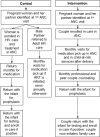Partners-based HIV treatment for seroconcordant couples attending antenatal and postnatal care in rural Mozambique: A cluster randomized trial protocol
- PMID: 29879469
- PMCID: PMC6067957
- DOI: 10.1016/j.cct.2018.05.020
Partners-based HIV treatment for seroconcordant couples attending antenatal and postnatal care in rural Mozambique: A cluster randomized trial protocol
Abstract
Background: In resource-limited rural settings, scale-up of services to eliminate mother-to-child transmission of HIV has not been as effective as in better resourced urban settings. In sub-Saharan Africa, women often require male partner approval to access and remain engaged in HIV care. Our study will evaluate a promising male engagement intervention ("Homens para Saúde Mais" (HoPS+) [Men for Health Plus]) targeting the elimination of mother-to-child transmission in rural Mozambique.
Design: We will use a cluster randomized clinical trial design to engage 24 health facilities (12 intervention and 12 standard of care), with 45 HIV-infected seroconcordant couples per clinic. The planned intervention will engage male partners to address social-structural and cultural factors influencing eMTCT based on new couple-centered integrated HIV services.
Conclusions: The HoPS+ study will evaluate the effectiveness of engaging male partners in antenatal care to improve outcomes among HIV-infected pregnant women, their HIV-infected male partners, and their newborn children. Our objectives are to: (1) Implement and evaluate the impact of male-engaged, couple-centered services on partners' retention in care, adherence to antiretroviral therapy, early infant diagnosis uptake, and mother-to-child transmission throughout pregnancy and breastfeeding; (2) Investigate the impact of HoPS+ intervention on hypothesized mechanisms of change; and (3) Use validated simulation models to evaluate the cost-effectiveness of the HoPS+ intervention with the use of routine clinical data from our trial. We expect the intervention to lead to strategies that can improve outcomes related to partners' retention in care, uptake of services for HIV-exposed infants, and reduced MTCT.
Keywords: Antenatal care; HIV/AIDS; Male partner engagement; Mozambique; Partners-based clinical services.
Copyright © 2018 Elsevier Inc. All rights reserved.
Figures
References
-
- Ministerio da Saude (MISAU), Instituto Nacional de Estatistica (INE), and I. International. Inquérito de Indicadores de Imunização, Malária e HIV/SIDA em Moçambique (IMASIDA) 2015. INS, INE e International; Maputo, Mozambique: 2015.
-
- Ministerio da Saude (MISAU), Instituto Nacional de Estatística (INE), and ICF International (ICFI) Moçambique Inquérito Demográfico e de Saúde 2011. MISAU, INE e ICFI; Calverton, Maryland, USA: 2013.
-
- Dahl V, et al. Acceptance of HIV testing among women attending antenatal care in south-western Uganda: risk factors and reasons for test refusal. AIDS Care. 2008;20(6):746–52. - PubMed
Publication types
MeSH terms
Grants and funding
LinkOut - more resources
Full Text Sources
Other Literature Sources
Medical



